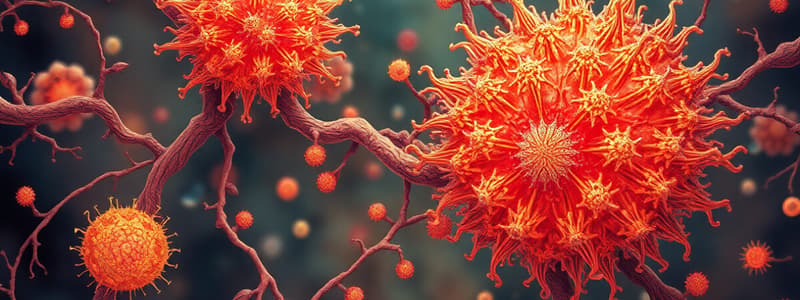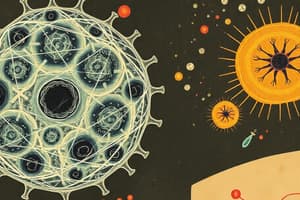Podcast
Questions and Answers
Which type of muscle tissue is responsible for voluntary movements, such as moving limbs?
Which type of muscle tissue is responsible for voluntary movements, such as moving limbs?
- Nervous muscle
- Skeletal muscle (correct)
- Smooth muscle
- Cardiac muscle
What is the primary function of vascular tissue in plants?
What is the primary function of vascular tissue in plants?
- Stores food and water
- Provides strength and support
- Forms protective outer covering
- Transports water and nutrients (correct)
Which tissue type allows for the exchange of materials and gases in plants?
Which tissue type allows for the exchange of materials and gases in plants?
- Epidermal tissue (correct)
- Meristematic tissue
- Ground tissue
- Vascular tissue
Where is cardiac muscle tissue found?
Where is cardiac muscle tissue found?
What is the role of meristematic tissue in plants?
What is the role of meristematic tissue in plants?
What is cell specialization?
What is cell specialization?
What are embryonic stem cells capable of?
What are embryonic stem cells capable of?
How do adult stem cells differ from embryonic stem cells?
How do adult stem cells differ from embryonic stem cells?
What type of tissue is defined by its ability to line body cavities and form protective barriers?
What type of tissue is defined by its ability to line body cavities and form protective barriers?
What is a primary function of connective tissue?
What is a primary function of connective tissue?
Where are meristematic cells found in plants?
Where are meristematic cells found in plants?
Which statement about tissue is accurate?
Which statement about tissue is accurate?
Which type of tissue forms blood and stores fat?
Which type of tissue forms blood and stores fat?
Flashcards
Cell Specialization
Cell Specialization
The process where cells develop unique structures and functions to perform specific tasks.
Differentiation
Differentiation
The process where cells change and become specialized, taking on distinct roles in the body.
Stem Cells
Stem Cells
Unspecialized cells with the ability to divide and differentiate into specialized cells.
Embryonic Stem Cells
Embryonic Stem Cells
Signup and view all the flashcards
Adult Stem Cells
Adult Stem Cells
Signup and view all the flashcards
Meristematic Cells
Meristematic Cells
Signup and view all the flashcards
Tissue
Tissue
Signup and view all the flashcards
Epithelial Tissue
Epithelial Tissue
Signup and view all the flashcards
Skeletal Muscle
Skeletal Muscle
Signup and view all the flashcards
Smooth Muscle
Smooth Muscle
Signup and view all the flashcards
Cardiac Muscle
Cardiac Muscle
Signup and view all the flashcards
Meristematic Tissue
Meristematic Tissue
Signup and view all the flashcards
What are the two types of vascular tissue?
What are the two types of vascular tissue?
Signup and view all the flashcards
Study Notes
Cell Specialization
- Cells develop specific functions through a process called cell specialization.
- Animal cells specialize into lung cells, skin cells, or brain cells.
- Plant cells specialize into xylem or phloem cells in roots, stems, or leaves.
Differentiation
- Differentiation is the process where cells change and acquire different functions.
- Embryonic stem cells can differentiate.
Stem Cells
- All body cells originate from stem cells.
- Stem cells are unspecialized cells.
- Stem cells can specialize under specific conditions or remain unspecialized and divide.
Types of Stem Cells
- Embryonic stem cells: Found in embryos. Can differentiate into various cell types.
- Adult stem cells: Differentiate from embryonic stem cells. Limited ability to form different cell types compared to embryonic stem cells.
- Meristematic stem cells: Plant stem cells found at root and stem tips and in the cambium. Active throughout the plant's life, constantly creating new cells of various types.
Tissues
- Tissues are groups of specialized cells performing specific tasks.
Types of Animal Tissues
- Epithelial tissue: Lines body cavities, outer body surface.
- Functions in protection and forming glands secreting hormones, enzymes, and sweat.
- Characterized by tightly packed cells forming a barrier.
- Connective tissue: Supports and protects body structures.
- Includes blood, tendons, ligaments, bones, and cartilage.
- Connects different tissues together.
- Muscle tissue: Enables movement.
- Three types: skeletal, smooth, and cardiac.
- Skeletal muscle controls body movements. Smooth muscle is found in internal organs. Cardiac muscle is only in the heart.
- Nervous tissue: Responds to stimuli.
- Composed of nerve cells transmitting messages (impulses).
Types of Plant Tissues
- Meristematic tissue: Plant stem cells, found in growing parts of the plant.
- Unspecialized cells dividing by mitosis.
- Epidermal tissue: Protective outer layer of the plant.
- Allows gas and material exchange.
- Contains guard cells forming stomata (pores) for gas exchange.
- Ground tissue: Most of the plant tissue.
- Provides strength and support (in stems).
- Stores food and water (in roots).
- Site of photosynthesis (in leaves).
- Vascular tissue: Transports water and nutrients within the plant.
- Xylem: Transports materials from roots to leaves.
- Phloem: Transports sugars from leaves to other parts of the plant.
Studying That Suits You
Use AI to generate personalized quizzes and flashcards to suit your learning preferences.




